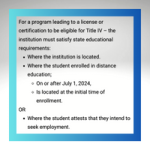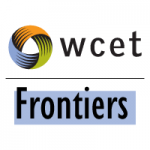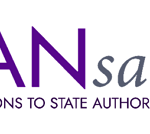New on WCET Frontiers

Policy
Ready or Not, Here It Comes! New Regulations When Offering Programs Leading to a License Effective July 1!
Published by: WCET | 5/16/2024
There is no more hiding from the eventuality of the effective date for new Federal regulations affecting the institutions serving students in programs leading to a license or certification. Institutions and the U.S. Department of Education (Department) have a common goal to support a student participating in an educational program leading to a state license […]

Policy
In Defense of Reciprocity – A Joint Letter to the Department of Education & Call to Action
Published by: WCET | 5/2/2024
On May 1, leading higher education organizations jointly submitted a letter to the Department of Education (the Department) detailing concerns about recently raised proposals regarding state authorization reciprocity agreements. Earlier this year, the Department’s negotiated rulemaking sessions included several recommendations to alter the operations of such state-to-state agreements. The Department was clear that the proposals […]

Policy
Call for Action: Contact Elected Officials About Proposed Distance Education Regulations
Published by: WCET | 4/5/2024
Important proposed regulations affecting distance education were discussed during the Department of Education’s Program Integrity and Institutional Quality negotiated rulemaking sessions that ended on March 7. In brief, you should take action: The Background On March 20th, we published a blog update on the final week of negotiated rulemaking. Despite tons of suggestions and hours of […]

Policy
Major Changes to Distance Ed: Department of Education Rulemaking Final Session Update
Published by: WCET | 3/20/2024
Major changes loom on the horizon for postsecondary distance education programs in the United States, but we are now in a temporary limbo of uncertainty. The Department of Education’s Program Integrity and Institutional Quality negotiated rulemaking sessions ended on March 7. Despite tons of suggestions and hours of discussion, none of the distance and digital […]
Policy
Major Changes to Distance Ed: Department of Education Rulemaking Week 2 Update
Published by: WCET | 2/13/2024
The film Nyad is sometimes difficult to watch as the titular character braves her way through a Cuba to Florida swim that took 53 hours of non-stop swimming. Along the way she is besieged by poisonous jellyfish, sharks, exhaustion, and the constant battering of waves. We feel a connection with her. Last week was the […]

Practice
Top 12 WCET Frontiers Posts of 2023
Published by: WCET | 2/2/2024
Happy 2024! I know you are probably a little sick of top 10 lists for things that went well, were trendy, or went poorly in 2023. So, I’ve made a top 12 list instead. Today we’re looking at our readership and views for the WCET Frontiers blog over the past year. In 2023, we published […]

Policy
Major Changes to Distance Ed Proposed: Department of Education Back to Rulemaking Table
Published by: WCET | 1/18/2024
Here we go again! Significant changes to postsecondary distance education operations emerged from the U.S. Department of Education’s (Department) Winter 2024 negotiated rulemaking discussion. The proposed changes could be huge and we suggest you read or scroll through this post to see what might affect you and your students. For example, state authorization reciprocity could […]

NetworksPractice
Celebrating Success: The 2023 SANsational Award Winners Are Unveiled
Published by: WCET | 12/14/2023
In the realm of excellence, there are those who go above and beyond to achieve greatness. Their dedication, passion, and outstanding contributions set them apart, and it is important to honor those contributions with prestigious awards. Today, the State Authorization Network (SAN), a division of WCET – the WICHE Cooperative for Educational Technologies, not only […]

Policy
Veterans Day History and Policy Issues to Watch When Serving Veterans
Published by: WCET | 11/10/2023
WCET would like to take this opportunity to acknowledge and show appreciation for our veterans and military affiliated families. Thank you to those who currently serve and have served in the U.S. Armed Services. WCET Frontiers would like to honor our veterans by sharing about the history of Veterans Day and also share some updates […]

Policy
New Federal Regulations, Part 2: Addressing Compliance with State Closure Laws and the Impact on Interstate Reciprocity Agreements
Published by: WCET | 10/31/2023
This is the second of our two-part blog post series on the recently released U.S. Department of Education regulations. The first covered new rules regarding programs leading to professional licensure. This one is about institutions complying with closure requirements in each state in which it serves students. We, especially, analyze the impact on the more […]